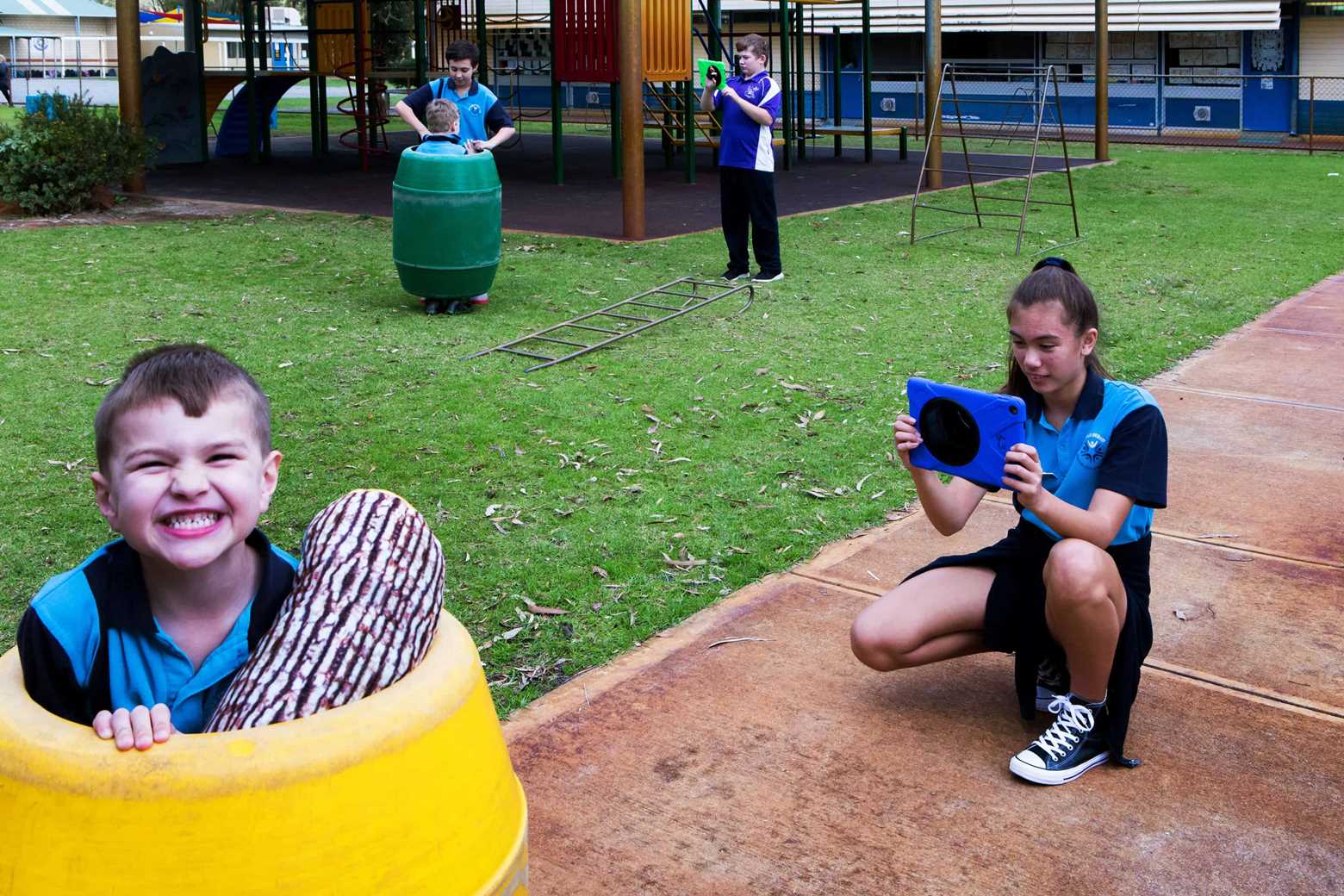Every day your child learns something new.
Every day they build on what they know.
What they learn today is the foundation for what they need to learn tomorrow.
That's why attending school is so important.
Absence from School
Parents/caregivers are required to inform the school if their child will be absent. Please SMS absentees to the school before 8.30am on 0438 579 518, include your child’s full name, reason and date of absence, alternatively, you can telephone the school on 9232 3600. Absentee notes can also bew sent through your Connect Account. For More information please read under the Connect tab in School Information.
Late arrival / Early Pick Up
Student arriving at school late should attend the school office to collect a late note prior to going to class.
If you need to collect your child from school early please attend the school office to sign your child out through our IPad sign out system. It is recommended for planned early collection to let the school know in advance. If Parent or Guardian require another family member or friend to collect your child please ensure the school is notified. Students can not be released to others not listed our school database.
Some common problems getting your child to school on time.
• They won’t get out of bed in the morning.
• They go to bed late at night.
• They can’t find their uniform, books or school bag.
• They are slow to eat breakfast.
• They haven’t done their homework or are avoiding a test or assignment.
• They are watching television or playing video games before school.
What can you do to help?
• Have a set time for your child to go to bed at night and get up in the morning.
• Have their uniform and school bag ready the night before.
• Set a time for daily homework activities.
• Talk about school positively.
• If running late, encourage your child to still go to school and reassure them that you will let the school know.
• Organise for your child to meet a friend before school so they can arrive at school together.
• Get involved at school through volunteering or participating in reading programs, school carnivals etc. or join the P&C.
Good attendance habits start early!
Disparities in attendance rates are evident from the early years. They become wider in secondary school. It is critical that good attendance patterns are established in the early years, the data says that if good attendance is not established early, then the child’s high school attendance will be far worse.
Missing school means missing out!
Regular attendance builds lots of other skills, not just learning. Schools help children to develop important social skills, such as friendship building, teamwork, communication skills and a healthy self-esteem. It also helps them to participate positively in regular school events that promote strong community spirit.
What if my child refuses to go to school? The school can offer a range of support options:
• Teacher working with the student in a supportive, counselling role
• School student welfare co-ordinator working with the student
• Provide a mentor for your child
• Home visits to identify the problem and help
• Work it through with parents
• Identify reasons why your child doesn’t want to go to school
• Strategies to help you encourage your child to go to school
• Develop an incentive program to encourage your child to attend school
• Link with community agencies.
Must I send my child to school every day? Yes, unless:
• your child is too sick or injured to go to school
• your child has an infectious disease
• the principal is provided with any other genuine and acceptable reason for absence.
Make sure you:
• provide the school with an explanation if your child is away.
• Ring or sms the office on the day.
• Provide evidence to explain their absence e.g. doctor’s certificate.
Regular attendance affects learning outcomes: every day counts! Don’t put your child at risk by poor attendance. Research data shows that even one day a week makes a significant difference.
Strategies to get to school on time every day!
Every now and then, we have chaotic mornings but having a regular routine assists and improves student attendance, Here are some suggestions which are based on setting regular routines:
• Have a set time to be out of bed
• Have a set time to go to bed
• Have uniform and school bag ready the night before
• Make lunches the night before
• Have a set time for starting/ending breakfast
• Set a daily time for homework activities
• Be firm, children must attend school
• Provide lots of positive encouragement
• Be firm, a birthday is not a holiday
• Turn the TV on only for a set time, and if appropriate
• Time arrival at school to coincide with bell time and leave quickly.
Birthdays and attendance
The best gift is a bright future! It is tempting to spoil our children with extra special attention on their birthday, but staying away from school for the day is not a gift. Arrange all the fun for after school hours or the closest weekend to the date or ask teacher for a small acknowledgement of their special day. In the eighteen years that children are at school, birthday absences alone would tally to over two weeks.
Communities benefit when children attend school If children don’t attend, they are at a higher risk of:
• Dropping out of school early
• Becoming long term unemployed
• Becoming caught in a poverty trap
• Becoming welfare dependent
• Being involved in the justice system
• Being socially isolated
• Having gaps in their knowledge and understanding
• Being harmed during time of absence
• Being more likely to be involved in illegal activities
• Feeling insecure about school
Don’t let problems at school be a reason to stay home.
• Work with the school if your child becomes reluctant to attend, in order to resolve the issue before it gets unmanageable.
• Let your child know that you don’t approve of them missing school.
• Seek advice from the school on how you can support my child to improve if they are under achieving.
• Help to develop resilience in your child by not allowing them to stay at home to avoid an issue at school. You can be firm in your expectations.
• Ensure that your child arrives on time and that they aren’t disorganised, flustered etc, or miss early literacy support time.
• Take an interest in your child’s schoolwork and get as involved in the school as you can. If you value it, your child will be more likely to.
So what are acceptable reasons for being off school?
Use this simple checklist as a guide for deciding if an absence is essential:
• Acceptable Reasons
• Illness
• Essential appointments
• Injury
• Infectious disease
• Bereavement
• Principal approved absence
• Unacceptable Reasons
• Birthdays
• Holidays during term time (unless prior approval granted)
• Visiting relatives
• Out of school sports
• Helping parents at home
• Feeling a bit tired from other events
• Appointments that could have been made after hours
Changing schools: Extra days off between changing schools
Moving between schools can be an opportune time for a “little break” from school but getting students quickly to their new school is very important so that learning is not missed and new routines and friendships are established quickly. Regardless of how many schools are attended, student data is tracked by the Department of Education every day and these absences remain on student records until they leave in Year 12. Make the move quickly to benefit your children!
Did you know?
• Missing half a day of school each week equates to one month of missed learning each year.
• The attendance habits set by children when they first start school continue throughout their school life.
• If children miss half a day of school each week between Pre Primary and Year 10, they would miss almost one full year of learning.
• Learning is cumulative – if children miss a day, it is harder for them to catch up.
• You can help by:
• Arriving and collecting your children on time.
• Making sure they eat nutritious meals and enough sleep.
• Making appointments with doctors, dentists and specialists outside school hours.
• Making holiday plans during school holidays and not during the school term

Gallery
View photos from our recent school activities.
Dress Code
The South Thornlie Primary School Council has established a dress code for all students attending the school.
Crunch & Sip
The Crunch & Sip program is an easy way to help kids stay healthy and happy!
Nut Minimisation
Nut Minimisation
Attendance
See the brochure for information regarding Student Attendance.


 08 9232 3600
08 9232 3600